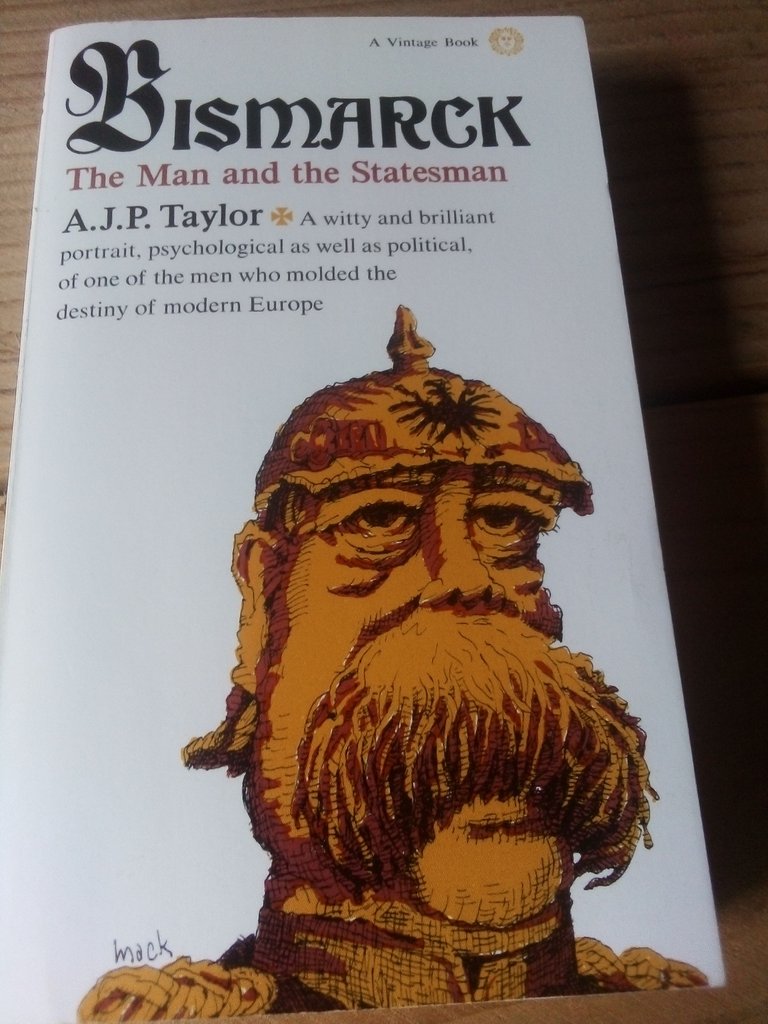
Good day Hivers and Book Clubbers,
Another day, another book read. Just kidding, I'm not nearly that fast. I also don't set goals when it comes to reading speed, really. When I see some people on this platform aim for reading X amount of books in Y amount of time, It is indicative of a mindset that I can't really get into. To each his own.
The book I'm writing about today is one I've read for the second time now. It really is an excellent work, on what I consider a very interesting subject, 19th century Europe. The book is fully titled 'Bismarck; the Man and the Statesman', written by British historian A.J.P. Taylor.
It's fair to say that Taylor is my favourite historian to read; I own about 10 books of his, and have read almost all of them at least once. His field of expertise was mostly 19th century central Europe, i.e. the German lands and the Habsburg dynasty. In this book, of which the story numbers about 270 pages, he wrote about one man; Otto von Bismarck (1815-1898), in the form of a biography. One reviewer on the back of the book dubs Bismarck as having 'the most earth-shaking career between Napoleon and Hitler', and I don't disagree. What he achieved has shaped Europe up until today.
Dissolute early life
Often when people become 'great', in a sense, you can tell from an early age. There is an early interest or obsession present, or a remarkable amount of talent, etc. Bismarck does not fit into this mold at all.
He tried several things in life before landing on diplomacy and politics; he became part of the Prussian civil service, in which he only lasted for weeks. He tried is hand at farming the family estate; Bismarck was descended from minor Prussian nobility, i.e. the Junkers. This was not succesful either. He only starts his political career after several switches at age 33, in 1848.
Counter-revolution, or fair-weather-politics?
1848 was quite a year to start in politics. It was a year in which several revolutions happened, which are not nearly as well remembered as the French (1789), American (1776) or Russian (1917) revolutions. Though a lot did happen; the French overthrew the monarchy and became a republic again, the most premier statesmen of Europe, Metternich, resigned his post as Austrian prime-minister, and Germany was restive as well.
There was liberal agitation in German-speaking lands, led by the founding of a national parliament in Frankfurt. A national parliament for the 30+ states that Germany consisted of at the time was bound to lead to opposition from the states themselves. Bismarck was there as Prussia's representative, and he was wholly opposed to the Revolution, and thus to the liberals at Frankfurt.
Ever since Bismarck's rise, there has been talk of where he would fit on the political spectrum. Of course, 19th century politics are somewhat difficult to imagine today. But whatever the spectrum was, Bismarck was all over it. A reactionary in the days of the Frankfurt Parliament, he became somewhat of a liberal when prime minister of Prussia and Chancellor of Germany, while later on he could be termed a conservative.
Bismarck was simply able and willing to adapt his positions according to what he considered necessary; he did not tie himself to a single ideology or, later on, a single political party. This did wonders for his career, though some people in retrospect accuse him of bad faith. Not Taylor; circumstances change, especially when you keep in mind the balance of power in Europe, the Industrial Revolution, massive urbanisation, the rise of socialism etc.
After Frankfurt, which collapsed in on itself over the years, Bismarck became a diplomat. For example, he was ambassador to Russia in St. Petersburg for several years. He also stayed in France. Thus, he got to know the countries he would be dealing with later on in life.
Becoming Prime Minister
Bismarck was seen as the rough man with an iron will. This made him some friends, but many enemies in the political arena as well. Yet Prussia looked at him in a time of crisis. In 1862, the question of the army arose in earnest.
The Prussian army was an institution in itself. A well-known saying was 'most states have an army; in Prussia, an army has a state'. While this is exaggerated, each man of military age served three years, and the army budget was massive. Prussian politics completely ground to a halt in 1862 on the issue of how the army would look going forward. Would it be a citizen's army with non-aristocratic officers, or would it become a small, very professional force with Junker officers?
To untie the knot, Bismarck was able to broker a compromise. Bismarck was recalled to Berlin and offered the role of Prime Minister. He was 47 years old at the time. He would stay in undisputed power of Prussia and, later on, Germany for 27 years, shaping Europe in the process.
Intermission
I notice I can't get even close to rounding off the story I wanted to tell up to this point. I'll dedicate a part 2 to 'Bismarck's Wars' and the unification of Germany. See you then!
-Pieter Nijmeijer
(Top image: self-made photo of book cover)
In a few minutes, I will be posting here, on this community, my first book review. Which is related to WWII as yours, @pieternijmeijer .
By the way, what an amazing book that one you show us on your post. Quite interesting indeed.